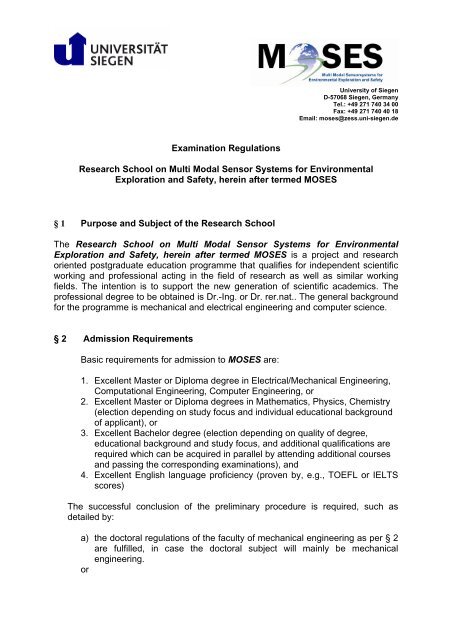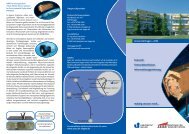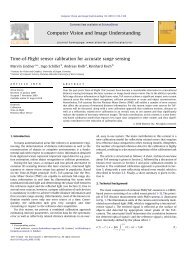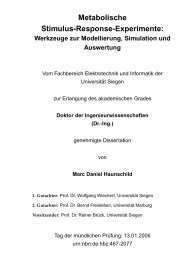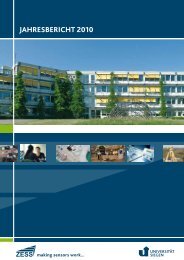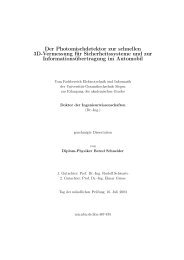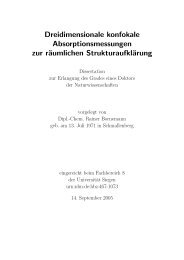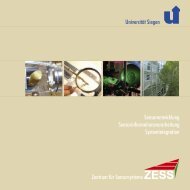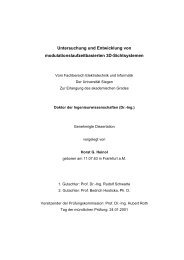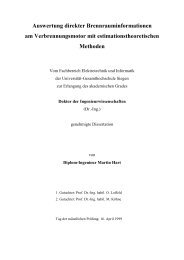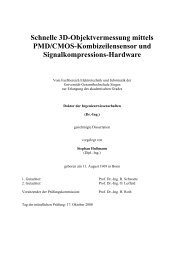MOSES Examination Regulations
MOSES Examination Regulations
MOSES Examination Regulations
You also want an ePaper? Increase the reach of your titles
YUMPU automatically turns print PDFs into web optimized ePapers that Google loves.
<strong>Examination</strong> <strong>Regulations</strong><br />
University of Siegen<br />
D-57068 Siegen, Germany<br />
Tel.: +49 271 740 34 00<br />
Fax: +49 271 740 40 18<br />
Email: moses@zess.uni-siegen.de<br />
Research School on Multi Modal Sensor Systems for Environmental<br />
Exploration and Safety, herein after termed <strong>MOSES</strong><br />
§ 1 Purpose and Subject of the Research School<br />
The Research School on Multi Modal Sensor Systems for Environmental<br />
Exploration and Safety, herein after termed <strong>MOSES</strong> is a project and research<br />
oriented postgraduate education programme that qualifies for independent scientific<br />
working and professional acting in the field of research as well as similar working<br />
fields. The intention is to support the new generation of scientific academics. The<br />
professional degree to be obtained is Dr.-Ing. or Dr. rer.nat.. The general background<br />
for the programme is mechanical and electrical engineering and computer science.<br />
§ 2 Admission Requirements<br />
Basic requirements for admission to <strong>MOSES</strong> are:<br />
1. Excellent Master or Diploma degree in Electrical/Mechanical Engineering,<br />
Computational Engineering, Computer Engineering, or<br />
2. Excellent Master or Diploma degrees in Mathematics, Physics, Chemistry<br />
(election depending on study focus and individual educational background<br />
of applicant), or<br />
3. Excellent Bachelor degree (election depending on quality of degree,<br />
educational background and study focus, and additional qualifications are<br />
required which can be acquired in parallel by attending additional courses<br />
and passing the corresponding examinations), and<br />
4. Excellent English language proficiency (proven by, e.g., TOEFL or IELTS<br />
scores)<br />
The successful conclusion of the preliminary procedure is required, such as<br />
detailed by:<br />
a) the doctoral regulations of the faculty of mechanical engineering as per § 2<br />
are fulfilled, in case the doctoral subject will mainly be mechanical<br />
engineering.<br />
or
2<br />
b) the doctoral regulations of the faculty of electrical engineering/computer<br />
science, as per § 2 are fulfilled, in case the doctoral subject will mainly be<br />
electrical engineering/computer science.<br />
§ 3 Application Procedure<br />
1. Application to <strong>MOSES</strong> is fully Web based and handled by the <strong>MOSES</strong><br />
application web site as specified on the general <strong>MOSES</strong> web site<br />
http://www.moses-research.de. The completed application must show the<br />
applicants ability and motivation, scientific interests and ideas regarding<br />
professional aims. The application consists of:<br />
a) Filling out the application and personal profile form,<br />
b) A description of the applicant’s personal affinity to the programme,<br />
c) Uploading the application documents:<br />
• Copy of a valid passport,<br />
• Curriculum vitae (CV),<br />
• Copy of secondary school leaving certificate (e.g. high school<br />
graduation),<br />
• Copies of all University degrees held (Diploma, M.Sc., B. Sc., etc.),<br />
• For each University degree held: Copies of transcripts of records,<br />
• Abstract/Summary of M.Sc. (Diploma) thesis, B.Sc. thesis,<br />
• Two letters of reference (in the form given by the template that can be<br />
downloaded) from recent professors/lecturers.<br />
d) An applicant´s self evaluation test (performed as a web based test),<br />
e) Individual aptitude tests (performed as a web based test).<br />
2. Based on the application and test results, high potential candidates may be<br />
invited to an academic interview.<br />
3. Decision about preliminary admission will be made by the Recruitment and<br />
Personal Affairs Committee (RPAC) of the Research School. Criteria of<br />
selected candidates are:<br />
a) The fulfilment of the prerequisites of item 1,<br />
b) The applicant’s willingness and competence to deal with complex and<br />
general theoretical and methodological problems,<br />
c) Academic qualification, referee’s evaluation, interviews and linguistic<br />
proficiency.<br />
4. Final Admission to the Research School is subject to and based on:<br />
a) Fulfilment of the last preceding paragraph,<br />
b) Statements of two scientific supervisors for the thesis, indicating the<br />
research project, confirmation of the scientific supervision, confirmation<br />
about the place of work, information how the research work will be<br />
financed,<br />
c) A description of the doctoral research project including the main aspects of<br />
the actual state of research and (preliminary) working schedule of the<br />
project.
3<br />
5. Male and female applicants should generally not surpass the age of 28. Wellfounded<br />
exceptions are possible,<br />
6. Decision about admission will be made by RPAC.<br />
§ 4 Admission to Intermediate Exam<br />
.<br />
Admission is granted if the graduate student,<br />
a) has submitted all necessary records concerning obligatory and optional<br />
courses of <strong>MOSES</strong>, agreed with the supervisors of the thesis,<br />
b) has handed over all necessary participation certificates of the optional<br />
courses of the individual research programme, and a proof issued by the<br />
supervisor about successful research work concerning the thesis topic.<br />
§ 5 Intermediate Exam<br />
In the intermediate exam the graduate student shall demonstrate the following<br />
issues:<br />
• Necessary scientific prerequisites to complete the doctoral work,<br />
• Awareness of scientific, technological and technical state of the art,<br />
methods and methodologies for the doctoral work,<br />
• Scientific novelty of the approach(es), pursued in the doctoral work,<br />
• Scientific capabilities in presentation, reasoning and defending the<br />
doctoral work.<br />
The intermediate exam is held as oral colleague exam and is evaluated by<br />
DEDC and the scientific supervisors of the doctoral work.<br />
Evaluation of the intermediate exam is made as per the following marks:<br />
1 = very good the performance is excellent<br />
2 = good the performance significantly exceeds medium standards<br />
3 = satisfactory the performance corresponds to medium standards<br />
4 = sufficient the performance fulfils, despite deficiencies, the standards<br />
5 = not sufficient the performance does, due to significant deficiencies, not<br />
fulfil the standards<br />
If the intermediate exam has not been passed, it can be repeated once during<br />
a period of 3 to 6 months. Should the performance repeatedly be not sufficient,<br />
the intermediate exam will be finally not passed and the graduate student will<br />
not longer be a researcher in <strong>MOSES</strong>.<br />
The doctoral student will obtain within 4 weeks a certificate, which indicates<br />
the result of the exam and the name of the examiners.
§ 6 Qualification for Admission to Doctorate Degree<br />
4<br />
For admission to the doctorate degree examination the following is to be<br />
proven:<br />
1. Regular and successful participation in courses and seminars, furthermore the<br />
participation in <strong>MOSES</strong>’ regular assessments (annual spring and annual fall<br />
presentations),<br />
2. Successful completion of intermediate examination,<br />
3. That a scientific thesis in German or English language about the doctoral<br />
research work has been submitted to the supervisor. The thesis must present<br />
a significant scientific contribution to the chosen topic of the research project.<br />
The supervisor shall use his influence to get the thesis or excerpts of it<br />
published in international scientific papers with an expert review system (peer<br />
review).<br />
§ 7 Evaluation of the Thesis<br />
To evaluate the thesis, DEDC shall obtain at least one external referee report,<br />
which is passed on to the doctoral committees of the faculties for means of<br />
consideration. Should the committee come to a negative result, the doctoral<br />
procedure cannot be initiated, the exam will finally not have been passed and<br />
if this is the case, the graduate student will be taken off the <strong>MOSES</strong> register.<br />
The graduate student will get within a period of two weeks a written<br />
confirmation that the thesis has been accepted as the written thesis or<br />
rejected.<br />
§ 8 Application for Doctoral Promotion<br />
The application for doctoral promotion is sent to the dean of the faculty coming<br />
into question and follows the doctoral regulations of the faculties of mechanical<br />
and electrical engineering/computer science, respectively, available as<br />
separate documents.<br />
The doctoral student has to submit the application for the doctorate degree to<br />
the deans of the faculties as per<br />
- § 5 of doctoral regulations of the faculty of mechanical engineering (Dr. Ing.), if<br />
the l subject and background is mainly mechanical engineering,<br />
- § 5 of doctoral regulations of the faculty of electrical engineering/computer<br />
science (Dr. Ing., Dr. rer. nat), if the doctoral subject and background is mainly<br />
electrical engineering/computer science. The final decision which doctoral<br />
degree is to be awarded is subject to the doctoral commission of the<br />
corresponding departments,<br />
- The final decision which faculty will be responsible for the implementation of<br />
the doctoral promotion is made by DEDC upon applicant’s suggestion,
5<br />
DEDC is responsible for the fulfilment of the doctoral regulations and verifies<br />
this fulfilment by a certificate which must be included in the applicant’s<br />
application.<br />
The graduate student has to submit, apart from the documentation mentioned<br />
in the study regulations, the following documents:<br />
1. certificate about the successful exam,<br />
2. the written confirmation about the positive evaluation of DEDC that the<br />
thesis has been accepted by the Research School.<br />
Siegen, September 2008<br />
Research School<br />
on<br />
Multi Modal Sensor Systems for Environmental Exploration and Safety (<strong>MOSES</strong>)


